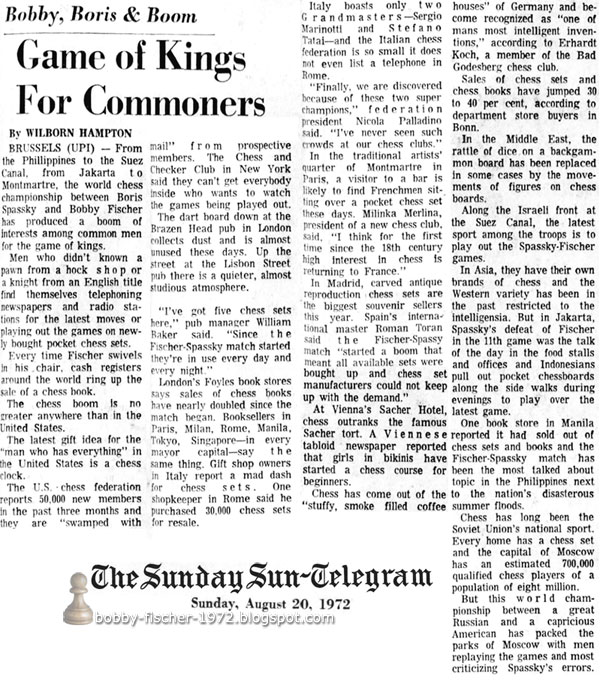The San Bernardino County Sun San Bernardino, California Sunday, August 20, 1972 - Page 15
Bobby, Boris and Boom: Game of Kings For Commoners
By Wilborn Hampton
Brussels (UPI)—From the Philippines to the Suez Canal, from Jakarta to Montmartre, the world chess championship between Boris Spassky and Bobby Fischer has produced a boom of interests among common men for the game of kings.
Men who didn't know a pawn from a hock shop or a knight from an English title find themselves telephoning newspapers and radio stations for the latest moves or playing out the games on newly bought pocket chess sets.
Every time Fischer swivels in his chair, cash registers around the world ring up the sale of a chess book.
The chess boom is no greater anywhere than in the United States.
The latest gift idea for the “man who has everything” in the United States is a chess clock.
The U.S. chess federation reports 50,000 new members in the past three months and they are “swamped with mail” from prospective members. The Chess and Checker Club in New York said they can't get everybody inside who wants to watch the games being played out.
The dart board down at the Brazen Head pub in London collects dust and is almost unused these days. Up the street at the Lisbon Street pub there is a quieter, almost studious atmosphere.
“I've got five chess sets here,” pub manager William Baker said. “Since the Fischer-Spassky match started they're in use every day and every night.”
London's Foyles book stores says sales of chess books have nearly doubled since the match began. Booksellers in Paris, Milan, Rome, Manila, Tokyo, Singapore—in every major capital—say the same thing. Gift shop owners in Italy report a mad dash for chess sets. One shopkeeper in Rome said he purchased 30,000 chess sets for resale.
Italy boasts only two Grandmasters—Serio Marinotti and Stefano Tatai—and the Italian chess federation is so small it does not even list a telephone in Rome.
“Finally, we are discovered because of these two super champions,” federation president Nicola Palladino said. “I've never seen such crowds at our chess clubs.”
In the traditional artists' quarter of Montmartre in Paris, a visitor to a bar is likely to find Frenchmen sitting over a pocket chess set these days, Milinka Merlina, president of a new chess club, said, “I think for the first time since the 18th century high interest in chess is returning to France.”
In Madrid, carved antique reproduction chess sets are the biggest souvenir sellers this year. Spain's international master Roman Toran said the Fischer-Spassky match “started a boom that meant all available sets were bought up and chess set manufacturers could not keep up with the demand.”
At Vienna's Sacher Hotel, chess outranks the famous Sacher tort. A Viennese tabloid newspaper reported that girls in bikinis have started a chess course for beginners.
Chess has come out of the “stuffy, smoke filled coffee houses” of Germany and become recognized as “one of mans most intelligent inventions,” according to Erhardt Koch, a member of the Bad Godesberg chess club.
Sales of chess sets and chess books have jumped 30 to 40 per cent, according to department store buyers in Bonn.
In the Middle East, the rattle of dice on a backgammon board has been replaced in some cases by the movements of figures on chess boards.
Along the Israeli front at the Suez Canal, the latest sport among the troops is to play out the Spassky-Fischer games.
In Asia, they have their own brands of chess and the Western variety has been in the past restricted to the intelligentsia. But in Jakarta, Spassky's defeat of Fischer in the 11th game was the talk of the day in the food stalls and offices and Indonesians pull out pocket chessboards along the side walks during evenings to play over the latest game.
One book store in Manila reported it had sold out of chess sets and books and the Fischer-Spassky match has been the most talked about topic in the Philippines next to the nation's disastrous summer floods.
Chess has long been the Soviet Union's national sport. Every home has a chess set and the capital of Moscow has an estimated 700,000 qualified chess players of a population of eight million.
But this world championship between a great Russian and a capricious American has packed the parks of Moscow with men replaying the games and most criticizing Spassky's errors.
























